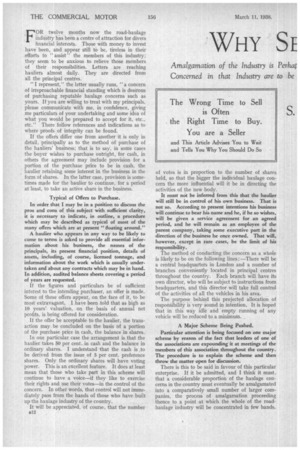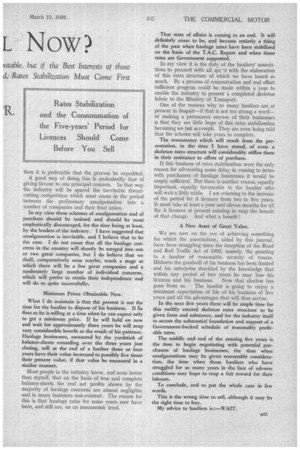WHY SE ow?
Page 46

Page 47

If you've noticed an error in this article please click here to report it so we can fix it.
F . OR twelve months now the road-haulage industry has been a centre of attraction for divers financial interests. Those with money to invest have been, and appear still to be, tireless in their efforts to " assist " the members of this industry; they seem to be anxious to relieve those members of their responsibilities_ Letters are reaching hauliers almost daily. They are directed from all the principal centres.
"I represent," the letter usually runs, "a concern of irreproachable financial standing which is desirous of purchasing reputable haulage concerns such as yours. If you are willing to treat with my principals, please communicate with me, in confidence, giving me particulars of your undertaking and some idea of what you would be prepared to accept for it, etc., etc." There follow references and indications as to where proofs of integrity can be found.
If the offers differ one from another it is only in detail, principally as to the method of purchase of the hauliers' business; that is to say, in some cases the buyer wishes to purchase outright, for cash, in others the agreement may include provision for a portion of the purchase price to be in cash, the haulier retaining some interest in the business in the form of shares. In the latter case, provision is sometimes made for the haulier to continue, for a period at least, to take an active share in the business.
Typical of Offers to Purchase.
In order that I may be in a position to discuss the pros and cons of this subject with sufficient clarity, it is necessary to indicate, in outline, a procedure which may be described as typical of most of the many offers which are at present "floating around."
A haulier who appears in any way to be likely to come to terms is asked to provide all essential information about his business, the names of the principals, its present financial position, details of assets, including, of course, licensed tonnage, and information about the work which is usually undertaken and about any contracts which may be in hand. In addition, audited balance sheets covering a period of years are requested.
If the figures and particulars be of sufficient interest to the intending purchaser, an offer is made. Some of these offers appear, on the face of it, to be most extravagant. I have been told that as high as 10 years' valuation, on the basis of annual net profits, is being offered for consideration.
• If the offer be acceptable to the haulier, the transaction may be concluded on the basis of a portion of the purchase price in cash, the balance in shares.
In one particular case the arrangement is that the haulier takes 50 per cent., in cash and the balance in ordinary shares. I understand that the cash is to be derived from the issue. of 5 per cent. preference shares. Only the ordinary shares will have voting power. This is an excellent feature. It does at least mean that those who take part in this scheme will continue to have a voice—if they like to exercise their rights and use their votes—in the control of the concern. In other words, that control will not immediately pass from the hands of those who have built up the haulage industry of the country.
It will be appreciated. of course, that the number af.2 of votes is in proportion to the number of shares held, so that the bigger the individual haulage concern the more influential will it be in directing the activities of the new body.
It must not be inferred from this that the haulier will still be in control of his own business. That is not so. According to present intentions his business will continue to bear his name and he, if he so wishes, will be given a service agreement for an agreed period, and he will remain as an employee of the parent company, taking some executive part in the direction of the business he once owned. That will, however, except in rare cases, be the limit of his responsibility.
The method of conducting the concern as a whole is likely to be on the following lines : —There will be a central headquarters in London and a number of branches conveniently located in principal centres throughout the country. Each branch will have its own director, who will be subject to instructions from headquarters, and this director will take full control of the activities of all the vehicles in his area.
The purpose behind this projected allocation of responsibility is very sound in intention. It is hoped that in this way idle and empty running of any vehicle will be reduced to a minimum.
A Major Scheme Being Pushed.
Particular attention is being focused on one major scheme by reason of the fact that leaders of one of the associations are expounding it at meetings of the members of this association throughout the country. The procedure is to explain the scheme and then throw the matter open for discussion.
There is this to be said in favour of this particular enterprise. If it be admitted, and I think it must, that a considerable proportion of the haulage concerns in the country must eventually be amalgamated into a comparatively small number of larger companies, the process of amalgamation proceeding thence to a point at which the whole of the roadhaulage industry will be concentrated in few hands, then it is preferable that the process be expedited.
A good way of doing this is undoubedly that of giving favour to one principal concern. In that way the industry will be spared the inevitable throatcutting competition which must ensue in the period between the preliminary amalgamation into a number of companies and their final union.
In my view these schemes of amalgamation and of purchase should be resisted and should be most emphatically discouraged, for the time being at least, by the leaders of the industry. I have suggested that amalgamation is inevitable, and I believe that to be the case. I do not mean that all the haulage concerns in the country will shortly be merged into one or two great companies, but I do believe that we shall, comparatively soon maybe, reach a stage at which there will be a few great companies and a moderately large number of individual concerns, which will prefer to retain their independence and will do so quite successfully.
Minimum Prices Obtainable Now.
What I do maintain is that the present is not the time for the haulier to dispose of his business. If ge does so he is selling at a time when he can expect only to get a minimum price. If he will hold on now and wait for approximately three years he will reap very considerable benefit as the result of his patience. Haulage businesses, measured by the yardstick of balance-sheets extending over the three years just closing, will at the end of a further three or four years have their value increased to possibly five times their present value, if that value be measured in a similar manner.
Most people in the industry know, and none better than myself, that on the basis of true and complete balance-sheets the real net profits shown by the majority of haulage concerns are almost negligible and in many instances non-existent. The reason for this is that haulage rates for some years now have been, and still are, on an uneconomic level. That state of affairs is coming to an end. It will definitely cease to be, and become entirely a thing of the past when haulage rates have been stabilized on the basis of the T.A.C. Report and when those rates are Government supported.
In my view it is the duty of the hauliers' associations to proceed with all spc-d with the elaboration of this rates structure of which we have heard so much. By a process of concentration and real effort sufficient progress could be made within a year to enable the industry to present a completed skeleton fabric to the Ministry of Transport.
One of the reasons why so many hauliers are at present in despair—if that is not too strong a word— of making a permanent success of their businesses is that they see little hope of this rates stabilization becoming un fait accompli. They are even being told that the scheme will take years to complete.
The reassurance which will result from the presentation, in the time I have stated, of even a skeleton rates structure will considerably stiffen them in their resistance to offers of purchase.
If this business of rates stabilization were the only reason for advocating some delay in coming to terms with purchasers of haulage businesses it would be amply sufficient. But there is another reason, equally important, equally favourable to the haulier who will wait a little while. I am referring to the increase of the period for A licences from two to five years. It must take at least a year and eleven months for all the A licences at present existing to reap the benefit of that change. And what a benefit !
A New Asset of Great Value.
We are now on the eve of achieving something for which the associations, aided by this journal, have been struggling since the inception of the Road and Rail Traffic Act of 1933, namely, the granting to a haulier of reasonable security of tenure. Hitherto the goodwill of his business has been limited and his enterprise shackled by the knowledge that within any period of two years he may lose his licences and his business. Now that shadow has gone from us. The haulier is going to enjoy a minimum expectation of life of his business of five years and all the advantages that will thus accrue.
In the next five years there will be ample time for this swiftly erected skeleton rates structure to be given form and substance, and for the industry itself to secure the substantial foundation and support of a Government-backed schedule of reasonably profitable rates.
The middle and end of the ensuing five years is the time to begin negotiating with potential purchasers of haulage businesses, the time when amalgamations may be given reasonable consideration, the time when those hauliers who have struggled for so many years in the face of adverse conditions may hope to reap a fair reward for their labours.
To conclude, and to put the whole case in few words.
This is the wrong time .to sell, although it may be the right time to buy.
My advice to hauliers is :—WAIT.
















































































